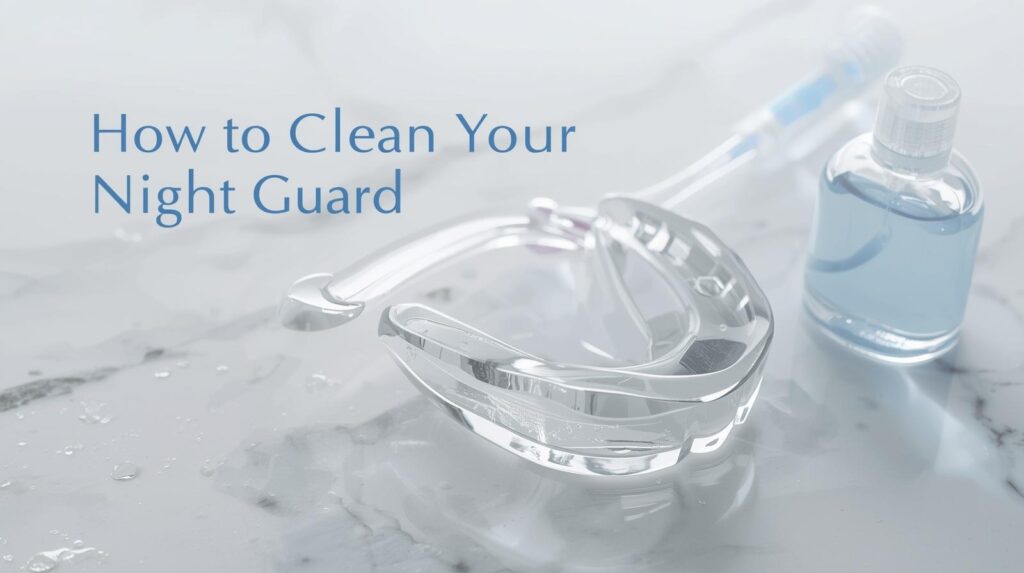How to Clean Night Guard: Easy Steps for Fresh Oral Protection
You wake up, peel that sweaty piece of plastic from the roof of your mouth, and give it a quick rinse under the tap. It’s a familiar morning ritual for millions of night guard users. But have you ever stopped to think about what’s really lurking on that device after a full night’s work?
Your night guard is a hero. It protects your teeth from the immense forces of grinding and clenching, saving you from jaw pain, headaches, and costly dental repairs. But this nightly hero works in the dark, damp, and bacteria-rich environment of your mouth. Without a proper cleaning routine, it can quickly become a villain—a biofilm-covered petri dish that you willingly insert every night.
Learning how to clean night guard appliances isn’t just about avoiding “ick” factor; it’s a critical part of your oral and overall health. This guide will walk you through everything you need to know, from a quick daily rinse to a weekly deep clean, ensuring your oral protection stays fresh, clear, and effective for years to come.
Why Proper Night Guard Cleaning is Non-Negotiable
Think of your night guard like a kitchen sponge. It’s porous, it’s exposed to moisture and organic matter, and if you never properly clean it, it becomes a breeding ground for trouble.
A 2011 study published in the Journal of Clinical Dentistry analyzed the microbial contamination of dental appliances and found that neglected devices can harbor a cocktail of bacteria and fungi, including Candida albicans (yeast) and Staphylococcus species.
The consequences of a dirty night guard are more than just bad breath:
- Oral Thrush: A fungal infection causing white lesions and soreness.
- Gingivitis: Inflammation of the gums from plaque buildup.
- Stomatitis: Inflammation of the soft tissues in the mouth.
- General Illness: Introducing bad bacteria into your system can compromise your immune health.
- Degradation of the Guard: Plaque and tartar buildup are acidic. They can etch and weaken the plastic of your guard, causing it to become cloudy, smelly, and brittle over time, shortening its lifespan.
Your night guard hygiene routine is your first line of defense. It protects your investment and, more importantly, your health.
Your Daily Cleaning Routine: The 2-Minute Morning Ritual
Consistency is key. This quick routine should happen every single morning after you remove your guard.
What You’ll Need:
- Cool or lukewarm water (NOT hot)
- A soft-bristled toothbrush (dedicated solely to cleaning your guard)
- Unscented, mild antibacterial soap (e.g., liquid hand soap) or specific cleaning paste
The Steps:
- Rinse Immediately: As soon as you take it out, hold your night guard under a stream of cool running water. This washes away the bulk of the saliva and loose debris before it has a chance to dry and stick.
- Gentle Brush: Put a tiny drop of mild soap on your soft-bristled brush. Gently scrub every surface of the guard—the inside, the outside, the grooves. Pay special attention to any ridges or cloudy-looking areas where plaque loves to hide.
- Rinse Thoroughly: This is crucial! Make sure you rinse off every last bit of soap under running water. Soap residue tastes terrible and can cause stomach upset if ingested.
- Dry Completely: Pat your guard dry with a clean, lint-free towel or let it air dry completely on a clean tissue. Do not put it away wet. A closed, damp case is a paradise for mold and bacteria.
Pro Tip: Avoid toothpaste for daily cleaning. Most toothpastes contain abrasives and whitening agents that are too harsh for the acrylic of your guard and can create microscopic scratches, making it easier for bacteria to adhere and harder to clean in the future.
The Weekly Deep Clean: Banishing Stubborn Buildup
Even with a perfect daily routine, some buildup is inevitable. A weekly deep clean will tackle the stubborn biofilm and ensure a like-new freshness.
Method 1: The Denture Cleaner Soak (Easy & Effective)
Denture cleaning tablets are a fantastic, dentist-recommended option. They are specifically designed to dissolve biofilm and kill germs on dental acrylics without being abrasive.
- Step 1: Fill a glass with lukewarm water.
- Step 2: Drop in one effervescent tablet and let it dissolve.
- Step 3: Submerge your night guard completely. Soak for the time recommended on the package (usually 5-15 minutes).
- Step 4: Remove the guard, give it a quick brush with your soft brush, and rinse thoroughly.
Method 2: The Vinegar Soak (Natural Alternative)
A diluted white vinegar solution is a great natural disinfectant.
- Step 1: Mix one part white vinegar with three parts cool water in a glass.
- Step 2: Soak your guard for no more than 15-20 minutes. Do not over-soak, as the acidity can, over time, affect the material.
- Step 3: Remove, brush, and rinse very thoroughly to eliminate any vinegar taste.
Method 3: The Baking Soda Paste (For Stains & Odors)
For a guard that’s looking a little yellow or holding onto odors, baking soda is a mild, non-abrasive solution.
- Step 1: Make a paste with a teaspoon of baking soda and a few drops of water.
- Step 2: Use your soft brush to gently scrub the paste over the guard.
- Step 3: Let it sit for 5 minutes before rinsing completely.
A Note on Commercial Cleaners: There are many products specifically marketed for cleaning dental appliances and mouthguard maintenance. Brands like Retainer Brite or SonicBrite are excellent options. Always follow the manufacturer’s instructions.
Also Read: Ingredients in Vullkozvelex
What to Absolutely Avoid: Protecting Your Investment
Knowing what not to do is just as important as knowing the right steps. Here’s a quick list of cleaning don’ts:
| What to Avoid | Why It’s Bad |
| Hot or Boiling Water | Will warp and melt the plastic, ruining the custom fit. |
| Harsh Chemicals | Bleach, alcohol-based cleaners, and peroxide (in high concentrations) can degrade the acrylic and are toxic to ingest. |
| Abrasive Tools | Stiff brushes, scrub pads, and toothpaste will create scratches that harbor more bacteria. |
| The Dishwasher | The extreme heat and harsh detergents will destroy your guard. |
Beyond Cleaning: Storage and Knowing When to Replace

A proper cleaning routine is useless if you store your guard in a dirty, sealed environment.
Storage Best Practices:
- Always ensure your guard is completely dry before placing it in its case.
- Leave the case open for an hour after use to air out.
- Clean the case itself regularly with soap and water.
When to Replace:
No amount of cleaning makes a night guard last forever. The American Dental Association suggests that night guards typically last 2-5 years with proper care. Replace yours if you notice:
- Visible cracks, chips, or thinning material.
- A loose fit that shifts during the night.
- An inability to get it clean and odor-free.
- Increased tooth or jaw pain, indicating it’s no longer providing adequate protection.
Your Fresh Guard Awaits
Learning how to clean night guard devices properly is a simple habit with profound benefits. It ensures that the device you rely on for peaceful sleep and healthy teeth is itself a bastion of cleanliness, not a source of problems. A clean guard is a fresh guard—and your mouth will thank you for it every morning.
Conclusion
Your night guard protects your smile from bruxism, but it needs proper care to stay effective. Cleaning it isn’t a chore—it’s part of your oral hygiene routine. With a quick daily rinse and brush, a weekly deep clean, and smart storage, you’ll keep it fresh, clear, and long-lasting. A clean guard means a healthy mouth.
Read More Like This: Aqua Sculpt Reviews
FAQs
Can I use toothpaste to clean my night guard?
No. Toothpaste is abrasive and can scratch the guard, making it trap bacteria. Use mild soap instead.
How often should I deep clean my night guard?
Once a week is ideal; twice if you notice buildup or odors.
Why is my night guard turning yellow?
Stains from plaque, tartar, or drinks like coffee. Use baking soda or denture tablets—avoid bleach.
Is vinegar safe for daily cleaning?
No. Use a diluted vinegar soak once a week only.
What’s the best way to store it?
Dry it completely and keep it in a ventilated case. Wash the case regularly.

